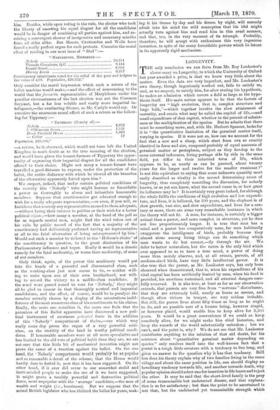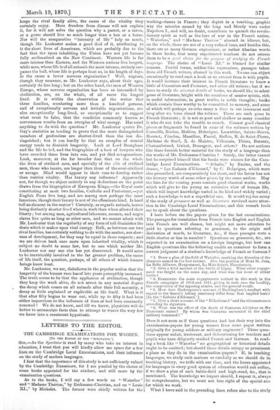LONGEVITY.
TILE only conclusion we can form from Mr. Ray Lankester's clever essay on Longevity, to which the University of Oxford last year awarded a prize, is that we know very little about the matter. Even the data are very imperfect, and Mr. Lankester's own theory, though ingeniously worked out, fails to satisfy us, and, as we suspect., to satisfy him, for after stating his hypothesis, he makes an admission which covers a field as large as the hypo- thesis itself. His main notion appears to be that the factors of longevity are "high evolution, that is, complex structure and large bulk,"—which together involve the slow attainment of maturity, and create what may be called the capital of life,—and small expenditure of that capital, whether in the pursuit of subsist- ence or the multiplication of the species. But he admits that there must be something more, and, with Mr. Herbert Spencer, looks for it in "the quantitative limitation of the germinal matter itself, varying in species. If it were not so, how can we account for the fact that a cow and a sheep, which start from ova so exactly identical in form and size, composed probably of equal amounts of germinal matter or protoplasm, subject as they develop to the same external influences, living perhaps side by side in the same field, yet differ in their inherited term of life, which appears to be, as nearly as can be guessed, about twenty years for the larger and twelve for the smaller ruminant ?" Is not this equivalent to saying that some unknown quantity most easily described as vitality is the second determining cause of longevity, thus completely unsettling the discussion, for nobody knows, or as yet can know, what the second cause is, or how great its influence maybe? It is certainly very great indeed, for although the whale fulfils the conditions of high evolution and low expendi- ture, and lives, it is believed, for 300 years, and the elephant is of slow growth, vast size, and slow expenditure, and lives for a cen- tury or more, there are some very remarkable instances in which the theory will not fit. A man, for instance, is certainly a bigger animal than a parrot, and more complex in structure, yet he does not live proportionately longer. It is true that man has a mind and a parrot has comparatively none, for men habitually exaggerate the intelligence of birds, probably because they almost alone among living things can do something which man wants to do but caunot,—fly through the air. We defer to better naturalists, but the raven is the only bird which ever appeared to us to have a true mind, a power of doing more than merely observe, and, at all events, parrots, of all medium-sized birds, have very little intellectual power. It is also true that the parrot, as Mr. Laukester says, has only been observed when domesticated, that is, when his expenditure of his vital capital has been artificially limited by man, when his food is provided, his exertions restrained, and all external dangers care- fully removed. It is also true, at least as far as our observation extends, that parrots are very free from " nervous " disturbance, that they are extremely bold, nearly as brave as ravens, and though often vicious in temper, are very seldom irritable. But still, the parrot lives about fifty times as long as he ought to do, and no possible care of a human being, however stupid, or however placid, would enable him to keep alive for 3,500 years. It would be a great convenience if we could so keep somebody alive, for we might make him chief historian, and keep the records of the world substantially unbroken ; but we can't, and the point is, why? We do not see that Mr. Lankester contributes anything to the solution of that old doubt, fot his sentence about "quantitative germinal matter depending on species" only resolves itself into the well-known fact that a parrot is a tough little creature with a tendency to live long, and gives no answer to the question why it has that tendency. Still less does his theory explain why of two families living in the same village and about the same position in life, one should display an hereditary tendency towards life, and another towards death, why popular opinion should select one for insertion in life leases and reject the other. It may be said that the short-lived family is the prey of some transmissible but undetected disease, and that explana- tion is so far satisfactory ; but then the point to be ascertained is not that, but the undetected yet transmissible strength which keeps the rival family alive, the cause of the vitality they 'certainly enjoy. Mere freedom from disease will not explain it, for it will not solve the question why a parrot, or a raven, or a goose should live so much longer than a hen or a horse. Nor will the comparative "intensity of life" help us much, though Mr. Laukester makes a good deal of it, attributing to it the short lives of Americans, which are probably due to the fact that the races inhabiting the Union have not yet become fully acclimatized on the New Continent. Western life i3 far more intense than Eastern, and the Western nations live longest, while man, whose life is of all animals the most intense, entirely sur- passes the bull, whose life is perhaps least so, in his length of days. Is the cause a lower nervous organization ? Well, negroes, -though they romance, as Mr. Laukester says, about their ages, .certainly do live long ; but on the other hand, the men of Western Europe, whose nervous organization has been so intensified by .civilization, are, on the whole, of all races the longest lived. It is within the observation pf the writer that three families, numbering more than a hundred persons, and of exceptionally nervous and irritable organizations, are also exceptionally long-lived, so exceptionally as to suggest what must be false, that the condition commonly known as nervousness results from an overplus of vital energy. Has mind :anything to do with the question ? Mr. Lankester quotes Dr. Guy's statistics as tending to prove that the more distinguished members of professions are shorter-lived than the less dis- tinguished; but it can hardly be that an overplus of mental energy tends to diminish longevity. Look at Lord Brougham and the life he led, and the biographies of a host of lawyers who have crowded three lives into one, and yet died octogenarians. 'Look, moreover, at the far broader fact that on the whole -the lives of civilized men, and specially of the elite of civilized 'men, those who insure, are longer than those of the semi-civilized or savage. Mind would appear in their case to develop rather than restrict vitality. Has luxury any influence? Apparently not, for though we object entirely to any deductions on the point drawn from the biographies of European Kings,—the Royal caste .constituting at most two families, Catholic and Protestant,—yet English Peers live long, and are among men perhaps the most luxurious, though their luxury is not of the effeminate kind. Is hard *toil an element in the matter ? Certainly, as regards animals, horses being distinctly shorter lived when in work than when allowed their 'liberty ; but among men, agricultural labourers, seamen, and negro slaves live quite as long as other men, and we cannot admit with Mr. Lankester that the regularity of any form of toil diminishes the drain which it makes upon vital energy. Bulk, as between our two 'rival families, has certainly nothing to do with the matter, nor slow- ness of development, for they may be equal in those respects ; and we are driven back once more upon inherited vitality, which is subject no doubt to some law, but to one which neither Mr. Lankester nor any one else has yet discovered. It would seem to be inextricably involved in the far greater problem, the cause of life itself, the question, perhaps, of all others of which human -beings know least.
Mr. Lankester, we see, disbelieves in the popular notion that the longevity of the human race has of late years perceptibly increased. The truth seems to be that the appliances of civilization, though -they keep the weak alive, do not arrest in any material degree the decay which comes on all animals after their full maturity, a -decay as little explained or explicable as life itself. What is it that after fifty begins to wear out, while up to fifty it had been .either impervious to the influence of time or had been constantly 'renewed? We do not know, and till we know, physicists will do better to accumulate facts than to attempt to weave the very few 'we know into a consistent hypothesis.









































 Previous page
Previous page